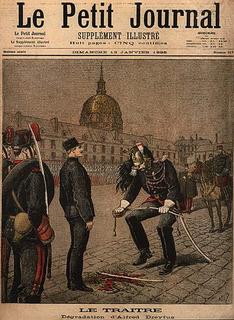
A friend from France writes me:
I have read many articles about your case and my feelings about this whole thing are mixed. You have done or said things that were really stupid. At the same time, I am sure that you have not been fairly tried and judged.
Saying stupid things in America is not a criminal offense.
Otherwise half the country would be locked up.
But speaking as an educated Frenchman and one very familiar with the history of your country, which has been proven countless times in our discussions: Do you not see ominous parallels with the Dreyfus Affair and my case in that the Government of France wrongly tried, convicted and sent to Devil's Island a man for espionage whose only crime was that he was a professional soldier and loved France?
The history books speak volumes on The Dreyfus Affair. Perhaps one day they will speak of The Barbour Affair. I have felt for quite sometime that at the end of day the Government would offer an apology to me and pay damages. I only need a Emile Zola to write an American version of, "I ACCUSE!" to start the hive humming. A hive that is increasingly Right Wing and increasingly willing to bring intense pressure on the American Government to pardon the victims of the Clintons.
Another interesting parallel between the case of Sergeant Barbour and that of Captain Dreyfus is that I was arrested in 1994, exactly 100 years after Dreyfus in 1894, and that I spent almost the same amount of time in prison (I was released in 1998 for good conduct, but my original sentence was to last until 1999) -- and that my health was nearly ruined as was the case Dreyfus -- And that redress for me can only come as a result of intense public pressure on the Government, as was the case finally with Dreyfus.
The year 2006 will mark the 12th year of The Barbour Affair.
The article, by Emile Zola, the great French novelist, appeared in a Paris literary newspaper, L'Aurore (The Dawn) on Thursday, Jan. 13, 1898, "an essential date in the history of journalism," according to historian Jean-Denis Bredin. Written in the form of an open letter to the President of France, the 4,000 word article, entitled J'Accuse! (I Accuse!), rightly has been judged a "masterpiece" of polemics and a literary achievement "of imperishable beauty." No other newspaper article has ever provoked such public debate and controversy or had such an impact on law, justice, and society.
The appearance of Zola's article was the greatest day of the Dreyfus Affair, which tormented France for twelve years. The Affair, "one of the great commotions of history," in the words of historian Barbara W. Tuchman, arose out of the 1894 arrest and conviction for treason of Capt. Alfred Dreyfus, a Jewish artillery officer in the French army. Dreyfus, who was completely innocent, received an unfair trial at his court martial; the prosecution's case had no substance, and the conviction was based on false, supposedly incriminating documents, not introduced into evidence or disclosed to Dreyfus, which were secretly delivered to the trial judges after they had retired to consider their verdict. Dreyfus was sentenced to life imprisonment and expelled from the army. He was incarcerated off the coast of South America on Devil's Island from 1895 until 1899.

No comments:
Post a Comment